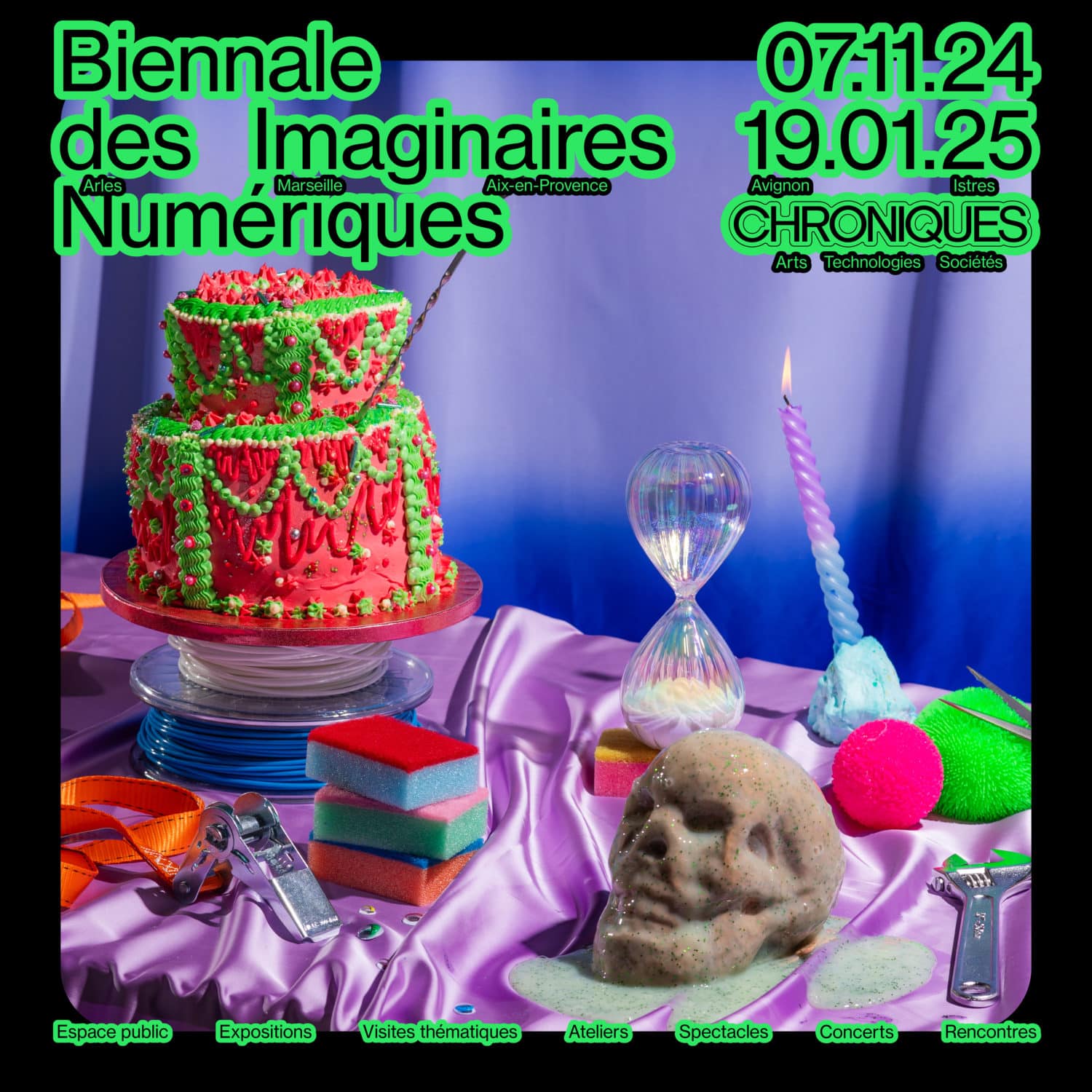Biennial 2024
The Biennial of Digital Imaginaries unveils its visual!
After attracting over 98,000 people to its third edition, the Biennale des Imaginaires Numériques returns from November 7, 2024 to January 19, 2025 in Aix-en-Provence, Marseille, Avignon and with new partners in Istres and Arles.

Three months of multidisciplinary programming for the curious.
A grand opening weekend featuring international exhibition openings, shows and festivities in the cities of Aix-en-Provence, Marseille, Avignon, Arles and Istres at some fifteen partner venues.
A series of original installations in downtown Aix-en-Provence, combining contemporary art and architecture;
Tours and workshops for everyone: solo visitors and families, those familiar with digital arts and culture and those new to it;
A closing weekend punctuated by live entertainment (concerts, shows, performances); A professional section with the first edition of the Marché des Imaginaires Numériques (MIN) at the opening, along with the Entreprendre dans la Culture forum, and professional meetings at the close of the biennial.
An international biennial
After welcoming Quebec, Taiwan and Belgium (Wallonia – Brussels – Flanders) in previous editions, the Biennial is delighted to welcome Lithuania as guest of honor for this fourth edition! Cette collaboration s’inscrit dans le cadre de la Saison lituanienne en France, organisée par l’Institut français. The program will also showcase Dutch digital creation, with a Focus on the Netherlands. The biennial will feature over 80 artists and 14 original creations from the CHRONIQUES CRÉATIONS platform, which brings together some 40 regional, national and international partners.
Theme: Pleasure
In a world of mounting environmental and social crises, for the Biennial of Digital Imaginaries 2024, we’re like to reflect on the place of pleasure in our daily lives: how can we imagine new sources of joy despite today’s challenges?
French philosopher Michael Foessel distinguishes two forms of pleasure. First, we have “satisfaction-based pleasures” where we seek to fulfil a pre-existing desire. These are the most frequent and common, relating to things we experience day to day, like food, culture, sex. Then there are “event-based pleasures” which are not preceded by a desire since they are pleasures that cannot be predicted in advance. These pleasures open up our imaginations through real experiences. This is what makes them subversive at their core: before experiencing them, we wouldn’t necessarily think them imaginable, so the lived experience of the impossible becomes possible.


It’s a pleasure that on top of all else exceeds our expectations or takes a previously unthought of direction, a moment where we experience an alternative world order.
Given the current state of emergency, the definition of pleasure and immediate satisfaction is far from anodyne and can, indeed must, be explored. Our desires as well as our practices reveal our contradictions, yet re-examining the question of pleasure opens up the possibility of imagining future worlds we desire to live in.
Indeed, the question of pleasure is closely linked to the question of ethics, because the choices we make which cause sadness have implications for our individual and collective well-being.
In Ce qui ne peut être volé (What Can’t Be Stolen), Cynthia Fleury and Antoine Fenoglio present the “Verstohlen Charter”, a German term meaning “stealth”. he philosopher and the designer speak about the need for preserving what makes the essence of a “good life”, otherwise known as the common good, vital good, essential need, capacity, capability, universal or inappropriable. According to the philosopher, safeguarding these spaces is important in order to take care of ourselves and others, restoring our ability to take action.
An eminently political notion previously explored by French historian and philosopher Michel Foucault, pleasure is often used as a means of political control whereby social norms dictate which forms of pleasure are acceptable and which are not. What’s more, Foucault pointed out that pleasure and desire are often instrumentalised to justify oppressive practices, such as male domination or economic exploitation. Conversely, it also demonstrates how pleasurable experiences can be harnessed as a means of resistance and subversion against oppressive social norms.
In the digital age, the question of pleasure is even more significant, because it is manifested through personalised recommendation algorithms. These algorithms tailor pleasurable experiences to individual tastes and preferences, but they can also serve to underscore existing biases and prejudices.
Faced with the multitude of issues that this raises, we want to address this subject in a multidisciplinary and critical way. We wish to explore the different facets of pleasure in the digital world, exploring how they connect with the social, political and ethical challenges of our time.

We shall examine this from different perspectives:
- Pleasure as an experience:
Technology, contrary to the preconceived notion that humans interface with soulless, electronic screens, creates experiences that increasingly engage our senses and emotions, and even manipulate or alter them. With digital tech, our devices have literally become extensions of ourselves: humanoids are used in the healthcare system; sex robots compensate for a lack of human relationships, smart devices listen to our conversations and instantly satisfy our needs. So what are the impacts of these inventions on the way we understand pleasure? - Pleasure as a performance:
Happiness and well-being is something we are increasingly told we have the absolute right to, a fact flooding digital platforms that encourage us to show our lives to the world, expose ourselves and compare ourselves to others. If well-being becomes productivist, how can we explore this performative dimension of pleasure while questioning the social and aesthetic norms that underlie it? - Pleasure as a strategy:
Meaning the strategy of digital industries that use pleasure to capture our attention. Faced with this, how can we call out these strategies of manipulation while imagining alternatives that promote personal autonomy and emancipation? - Pleasure as a subversive force by shifting the established order:
If happiness is political, should we change our desires or the world order? Like writer and philosopher Paul B. Preciado says, we may ask ourselves if the key to happiness is refusing the norm. - Pleasure as a possible future and happy ending:
What if digital technology ceases to be the cause and becomes the tool that can bring about the consequence? Technological appropriation and multiple cultural interpretations of the notions of networks and the virtual can lead to the invention of other forms of narrative. From these ideas and possibilities that question the common places for happiness, well-being and pleasure emerge happier and egalitarian possibilities for the future and new generations.


